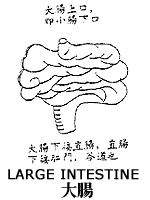In Traditional Chinese Medicine (TCM), the pushing force inside the intestines is achieved through the coordination of many
organs and a harmonized internal environment. Although constipation is primarily associated with qi disturbances in the large intestine (dysfunctional large intestine), disharmony in the spleen, stomach, lungs, kidneys, and liver may also contribute. The development of constipation involves various pathologies, which are interpreted below:

Large intestine and lungs

The
large intestine and the
lungs are connected through their
meridians, making them influential to one another both physiologically and pathologically. The lungs' descending actions facilitate the movement of intestinal contents through the large intestine, while a smooth functioning large intestine ensures the lungs can perform their dispersing actions.
When the lungs fail to regulate the water passages, body fluids cannot be distributed effectively throughout the body, the large intestine will then become dry, resulting in hard stools forming. If lung qi is deficient, the large intestine will also become weak, causing slow bowel movements and constipation.
Large intestine, spleen and stomach

The
spleen and
stomach are primarily responsible for digestion and absorption. They transform food and drinks into
nutrient essence and then transport the fundamental substance throughout the body. The spleen governs the "ascending of the pure," while the stomach governs the "descending of the impure." TCM interprets these coordinated
qi movements in the two organs as key roles in the digestive system. When these actions work in harmony, bowel movements proceed orderly, ensuring the contents move smoothly along the intestines. However, when the spleen or stomach is deficient, bowel movements will be interrupted, resulting in either constipation or diarrhea.
Additionally, improper dietary habits, such as overeating spicy or raw foods, can direct damage the stomach and intestines. This will cause excess
cold or
heat to accumulate in the gastrointestinal system, disturbing bowel movements and leading to constipation.
Large intestine and kidneys

In TCM,
kidneys are regarded as the foundation of life, serving several essential functions.
Kidney yang provides warmth and energy to various activities in the body. For example, their propelling and warming actions facilitate the functions of digestive system as below:
- Transformation and transportation in the spleen.
- Receiving and ripening ingested food and drinks in the stomach.
- Containing and transforming substances in the small intestine, referring to receiving semi-digested materials from the stomach that are further differentiated into nutrients and wastes.
- Pushing waste materials and absorbing fluids in the large intestine to prepare for elimination.
- Regulating the opening and closing of the anus.
Kidney yang deficiency causes under-functioning of the spleen, stomach, and intestines. As a result, the large intestine will lack motivation, leading to dysfunctional bowel movements and constipation.
On the other hand, kidney yin is responsible for nourishing and moisturizing
organs and tissues, helping balance body fluids and ensuring smooth organ function. Kidney yin deficiency often leads to internal dryness, which causes the large intestine to lack moisture. This dryness can result in difficulty bowel movements, characterized by hard and dry stools. This type of constipation often occurs in older adults or postnatal women.
Large intestine and liver

TCM
liver governs the "flowing and spreading" actions, playing a regulatory role in the coordination and operation of the spleen, stomach, and intestines. If the liver cannot perform its actions properly, the qi flow to these organs becomes interrupted, leading to disharmony and imbalance. For example, in cases of liver qi stagnation or liver fire, individuals often experience bowel difficulties along with abdominal bloating and anxiety.
In sum, TCM believes that constipation is a sign of a dysfunctional large intestine, causing individuals to have trouble passing stools, prolonged defecation times, or infrequent bowel movements. Constipation can be due to various factors, but its fundamental pathology can be categorized into two main types: either excess
pathogens accumulated in the large intestine, leading to sluggish qi movements in the
fu-organs, or inadequate warming or moistening support for the large intestine, causing intestinal contents to fail to move along.
While any abnormality in bowel movements should be understood in terms of changes in the functioning of internal organs, constipation often requires a
holistic approach rather than simply using laxatives or purging remedies for relief. This means physicians focus on balancing the body's internal harmony to promote overall health. They often use a combination of herbal remedies, acupuncture, dietary adjustments, and lifestyle changes to restore natural bowel patterns and provide long-lasting relief from intestinal motility issues.






